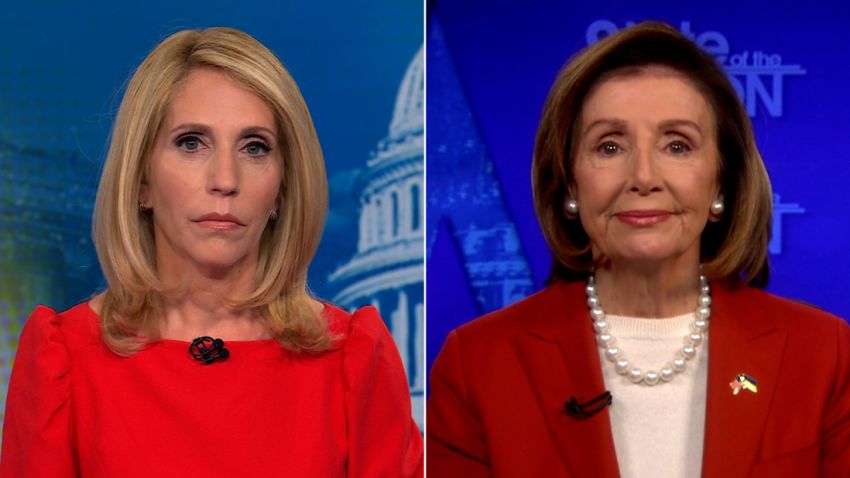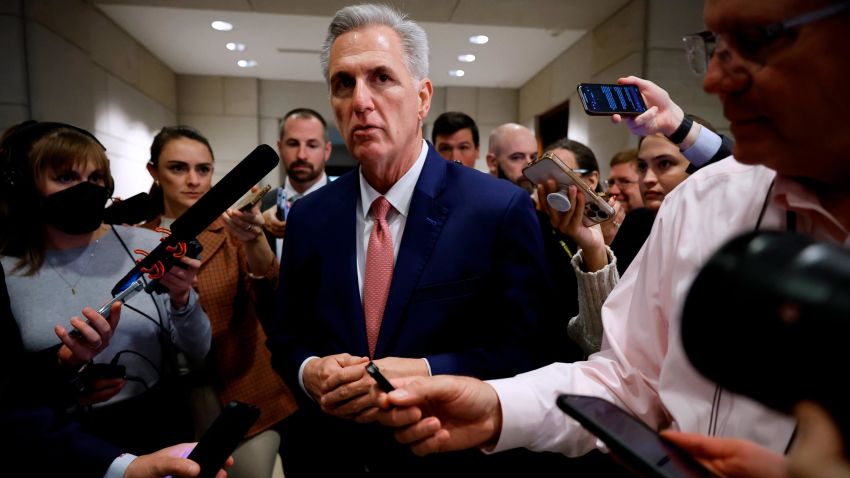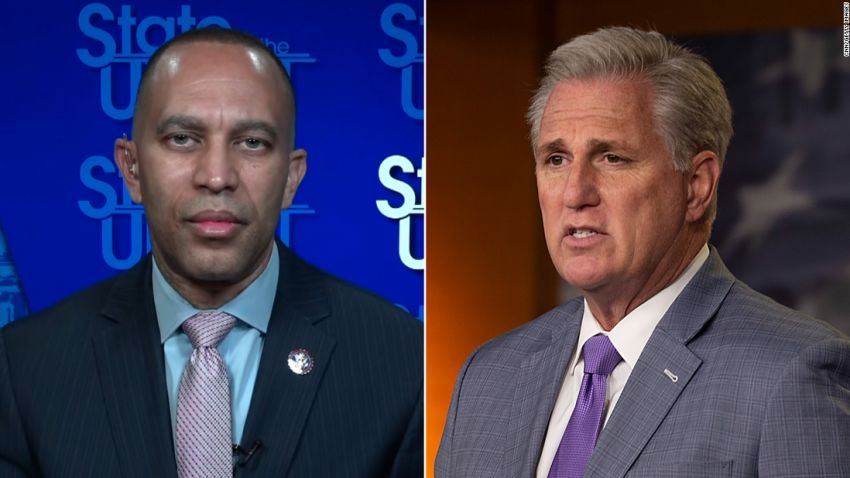As a right-wing faction threatens to tank his speakership ambitions, House GOP leader Kevin McCarthy delivered a promise: “I’ll never leave,” making clear he has no plans to drop out of the race even if the fight goes to many ballots on the floor.
“I’ll get 218,” McCarthy told CNN, referring to the votes he’d need to become House speaker.
But Rep. Andy Biggs of Arizona, a conservative hardliner who is challenging McCarthy to be the most powerful member of Congress, doubled down on his commitment to stop the California Republican’s ascension.
“I’m not bluffing,” Biggs told CNN on Thursday when asked if he would drop out.
With the increasing likelihood that the speaker’s race could go to multiple ballots – something that hasn’t happened since 1923 – McCarthy’s allies and foes alike are starting to quietly game out the next steps if he can’t get the necessary 218 votes on the first round and they move into uncharted territory.

McCarthy’s supporters are vowing to keep voting for him on multiple ballots, and GOP sources said there are early discussions about a floor strategy for that potential scenario, including whether to recess the House or let the votes keep rolling – no matter how long it takes.
To prevent that from happening, McCarthy and his team have been engaged in serious talks with a group of conservatives, including over potentially giving them influential committee assignments and more power to drive the legislative process. GOP sources said those negotiations are still early in the process and could ultimately end up giving the group some aspect of what the hardliners desperately want: additional power to seek a sitting speaker’s ouster with a vote on the floor.
Asked if he would drop out of the race if he doesn’t get 218 votes on the first ballot, Biggs refused to say.
“I’m not going to talk about hypotheticals,” said Biggs, who lost his conference’s nomination to become speaker last month after securing 31 votes.
But in the case of a doomsday scenario – where neither McCarthy nor Biggs can get 218 votes on January 3 and neither drops out – some pro-McCarthy Republicans are signaling support for a different approach. Some said they would be willing to work with Democrats to find a moderate Republican who can get the 218 votes to clinch the gavel – a long-shot idea that underscores the uncertainty looming over the speaker’s race.
“Our initial plan is vote for Kevin and let him fight this out repeatedly. … But if they think they’re going to use this to infinity to drive him out, well, we’re not going to bend to their will,” said Rep. Don Bacon, a Nebraska Republican.
Bacon added if GOP hardliners don’t bend, then he would be willing to work with Democrats to find another more moderate Republican to secure the 218 votes to become speaker.
“If a small group refuses to play ball and be part of the team, then we’ll work across the aisle to find an agreeable Republican,” Bacon said. “But I hope we don’t get there.”
McCarthy’s detractors don’t buy it.
“There are very significant rules, changes being discussed that would open the House up, that would be transformative, that would give us the ability to actually legislate and represent our constituents,” said Rep. Matt Gaetz, a Republican from Florida who said he’s a “hard no” on McCarthy. “And whoever is speaker is going to have to agree to those rules, I think. And I don’t think that person will be Kevin McCarthy because Kevin McCarthy won’t have 218 votes.”
Gaetz added: “I think the person who is ultimately going to be the speaker isn’t even the candidate yet.”
Indeed, the small group of Republicans known as the “Never Kevin” movement – confident that Biggs could not win a majority of the House – has been trying to recruit a viable alternative, and claim “several” Republicans have privately told them they would be interested in running if McCarthy drops out. Their goal with voting for Biggs is to show that McCarthy is weak on the first ballot, which they hope would inspire other candidates to jump in.
“How many members vote for someone else will show the strength (of the anti-McCarthy group),” Rep. Bob Good, a Virginia Republican who is a “hard no” on McCarthy, told CNN. “I think the second ballot is going to have more candidates. … There are already Republicans letting us know they’d like to be considered.”
Even House Republicans who are supporting McCarthy predicted that a number of lawmakers would run if McCarthy withdrew his name, with some saying that House Minority Whip Steve Scalise, McCarthy’s top deputy, would emerge as the front runner in that case.
“If at some point, if Kevin did take his name out, then you would have good people (running). Scalise would probably be the guy,” one GOP lawmaker said.
Scalise has repeatedly vowed to support McCarthy and refused to speculate on whether he would jump into the race if the GOP leader can’t get the votes.
“No, I’m not going to get into speculation,” Scalise told CNN. “Obviously, our focus is on getting it resolved by January 3. And there’s a lot of conversations that everybody has been having, Kevin, surely, with the members who have expressed concerns.”
Rep. Jim Jordan, the conservative set to become the chair of the House Judiciary Committee, went even further, ruling out jumping into the race even though Gaetz and other hardliners have urged him to seek the speakership.
“No,” Jordan said when asked if he’d run if McCarthy couldn’t get the votes. “I want to chair the Judiciary Committee.”
McCarthy’s weighs more concessions
With 222 GOP seats next year, McCarthy can only afford to lose four Republican votes and still win the speakership. But he and his team are still hopeful he can win on the first round as he has been working both publicly and privately to win over holdouts. So far, at least five Republicans have promised to oppose him on the floor – but in a positive sign for McCarthy, one of them has shown he’s gettable.
“I will vote for Andy for speaker, subject to what we’re discussing,” said Rep. Ralph Norman, a South Carolina Republican after leaving a meeting in McCarthy’s office on Wednesday. He later added: “All this is positive. We’re having good change, regardless of what happens. And you’ll see more of it.”
In addition to those five, a new group of seven Republican hardliners on Thursday laid out a list of conditions to earn their vote, although they did not specifically threaten to vote against McCarthy if their demands aren’t met.

Their list of demands – which shows the work McCarthy needs to do to get to 218 – includes a promise that leaders won’t play in primaries, restoring the motion to vacate the speaker’s chair, placing more conservatives on key committees, giving members at least 72 hours to read bill text before a vote, and committing to using the debt ceiling as a bargaining chip to demand more spending cuts, according to a copy of the letter obtained by CNN.
McCarthy has already begun brokering some rules changes to empower rank-and-file members, created a new select committee on China, vowed to boot some Democratic lawmakers from their committees, and sketched out in greater detail his investigative plans – including a potential impeachment inquiry into Homeland Security Secretary Alejandro Mayorkas.
But McCarthy still has additional levers he could pull. Conservative hardliners are pushing for more representation on the powerful House Rules Committee, a leadership-aligned panel that decides how and when bills come to the floor. In one private meeting with a member of the House Freedom Caucus, McCarthy was urged to take a harder public stance on the coming policy issues for next year, according to a person familiar with the matter.
And the anti-McCarthy group is also still pressing for a process that would allow any single member to hold a floor vote on ousting the sitting speaker, which was wielded over former Speaker John Boehner before he was forced out of the job by the far right in 2015.
McCarthy has been adamantly opposed to restoring the “motion to vacate the chair,” and a majority of the House GOP voted against the idea during a during a closed-door meeting last month. When asked by CNN on Thursday if he would visit the issue, McCarthy laughed and refused to answer.
But McCarthy’s detractors said it’s an issue very much still on the table and think he may end up needing to embrace it if he still doesn’t have the speaker votes by January 3. GOP sources told CNN there’s potential room to negotiate to give members more power to call for a vote to oust the speaker – perhaps by allowing the vote to occur if a certain number of members call for one, rather than allowing a single lawmaker to call for a vote as the hardliners want.
“A competent secure leader is not threatened by (the motion to vacate),” Good said. “And so, yeah, that I think that’s central to many members.”
Yet others said what Good and his allies are seeking is a recipe for chaos — and are calling on their colleagues to fall in line.
“I think that’s one of the reasons that we didn’t see a red wave … the idea that people are sick and tired of the noise, and they’re sick and tired of the fighting,” Rep. David Joyce, an Ohio Republican, said of the impact of a January 3 floor fight. “And I know I get that wherever I go in my district is, ‘why can’t you guys just get things done?’”
As McCarthy scrambles to lock down speaker’s votes, he also delayed the GOP’s internal elections for committee chairmanships. There was some speculation that one of the members competing for a gavel, Rep. Vern Buchanan of Florida, may retire early if he doesn’t win, which would make McCarthy’s math problem even tougher. But Buchanan vehemently disputed the notion.
“It’s ridiculous, laughable,” he told reporters. “I’m doing everything I can to help get Kevin to 218.”
McCarthy could also try to convince Democrats or his GOP detractors to vote present or not show up to the floor proceedings, which would lower the threshold he needs to become speaker. But McCarthy promised his GOP colleagues he would not court Democratic votes.
Could Democrats join Republicans and select a speaker?
In recent weeks, part of McCarthy’s pitch to his critics has been warning that if they don’t unify, then Democrats could theoretically band together and peel off a few Republicans to elect the next speaker.
Some Democrats have said they would entertain the idea, including Rep. Henry Cuellar, a moderate Democrat from Texas who told CNN some of his GOP colleagues have approached him “informally” about it.
Joyce also said some members have reached out to him about potentially running, but he dismissed it. “At the end of the day, Kevin’s going to be the new speaker.”
New York Rep. Hakeem Jeffries, the next House Democratic leader, said, “there are no behind-the-scenes conversations” that he has had with Republicans to put up an alternative candidate. But he refused to rule out a scenario where his caucus would help elect the next speaker if McCarthy couldn’t get the votes.

“Democrats are in the process of organizing the Democratic Conference,” Jeffries told CNN on Thursday. “Republicans are in the process of organizing the Republican Conference. Let’s see what happens on January 3.”
Some of the potential consensus picks that have been floated included retiring Reps. Fred Upton of Michigan and John Katko of New York, who both voted to impeach Donald Trump for inciting the Capitol insurrection; Rep. Brian Fitzpatrick of Pennsylvania, co-chair of the bipartisan Problem Solvers Caucus; and Oklahoma Rep. Tom Cole, a veteran lawmaker and incoming head of the House Rules Committee.
But that would require agreement from every single Democrat and the help of five Republicans – no easy feat. Upton said he has no plans to be in Washington that day, telling CNN: “I’ll be skiing.”
And progressives like Rep. Jamaal Bowman of New York said they would never vote for a GOP speaker candidate, no matter how moderate.
“No,” Bowman said, indicating he’d be voting for Jeffries on every ballot on January 3. “It’s going to be Hakeem.”
But Republican Rep. Bruce Westerman said this has happened before – nearly a decade ago in his state where minority Democrats in the Arkansas legislature joined forces with a handful of Republicans to elect a GOP speaker of their choice. Westerman privately made this case to his colleagues at a closed-door meeting this week.
“I’m concerned about January 3 getting here and us not being able to form a Congress and organize committees and getting delayed in pushing the policy objectives that we want to push,” Westerman said.
Westerman added that the discussion over changing House rules is good for the party. But he added: “I’m not really excited about any type of destructive movement.”
Morgan Rimmer and Annie Grayer contributed to this report.
"Short" - Google News
December 09, 2022 at 09:58PM
https://ift.tt/dBgeRIp
House Republicans brace for doomsday scenario if McCarthy falls short of 218 votes for speaker - CNN
"Short" - Google News
https://ift.tt/x5WNy3S
Bagikan Berita Ini














0 Response to "House Republicans brace for doomsday scenario if McCarthy falls short of 218 votes for speaker - CNN"
Post a Comment